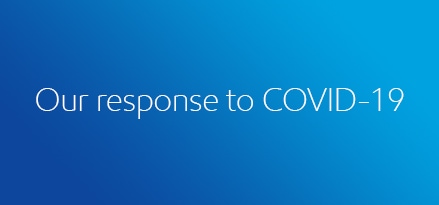
ExxonMobil continues to closely monitor the evolving COVID-19 situation and take actions to safeguard the well-being of our personnel and families globally. We have formed various working groups at the corporate, regional and country level and are meeting regularly to assess and respond to changing circumstances.
From a products and services perspective, the deliveries of ExxonMobil marine fuels and lubricants globally are subject to inspection and other delivery protocols, in accordance with local authorities’ guidance.
In an effort to better protect the safety of our global workforce from potential exposure to COVID-19, and in compliance with government directives on travel, ExxonMobil has also instituted travel restrictions for many countries.
We have rigorous business continuity plans in place and will continue to monitor the situation. Please do not hesitate to contact your ExxonMobil representative if you have further questions.
Useful links*
Wilhelmsen global port restriction map >
ICS guidance on protection of seafarers >
Information from IMO on COVID-19 >
ExxonMobil corporate response to COVID-19 >
*ExxonMobil is not responsible for the content of third-party websites.
Lubricant delivery updates due to COVID-19 (last updated on 12:30 CET 22 January 2021, subject to change)
Our lubricant delivery capability remains largely unchanged. However, below is a list of locations where we are aware that regrettably, we’re facing challenges in maintaining our flawless delivery of marine lubricants. We will take all necessary steps to ensure that this information is updated regularly and accurately. This overview is intended for ExxonMobil customers and is for information purposes only. Please contact your ExxonMobil representative for more specific information regarding orders and deliveries.
Singapore:
Port Authority has introduced additional mandatory Covid-19 testing and measures for shore based personnel boarding vessels. These include pre-boarding and post embarking Covid-19 testing, checks by facility and vessel owner/agent/master, minimizing interaction and stay on board social distancing, wearing of masks and PPE. We are adding these mandatory measures to ship call procedures and monitoring effectiveness of new requirements.
China:
All Port Authorities in China have restricted deliveries to vessels whose previous port of call has been within Japanese, Korean, Italian or Iranian waters.
All Customs Offices are now operational however ports of Dalian, Ningbo and Xiamen ports are requiring an increased time for processing customs documentation.
Ningbo and Xiamen ports are requiring an increased time for processing customs documentation.
All main ports are now functional, with limited disruption at various sub-ports:
- Caofeidian sub-ports: Huanghua and Qinhuangdao are not permitting lubricant deliveries.
-
Qingdao main port are restricting bulk deliveries or pumping ex-drum. Only deliveries of sealed drums on board permitted.
Qingdao sub-ports: Dongjiakou, Yantai, Weihai, Shidao, Penglai, Longkou and Shidao are not permitting lubricant deliveries; with Laizhou subject to enquiry. - Shanghai sub-port: Waigaoqiao No 5 is only permitting food and drink deliveries, and lubricant supply is restricted. Face-to-face delivery of lubricants is no longer permitted; packages can be provided on deck via the vessel’s crane, with the vessel crew responsible for any pumping/hose connection and safe decanting of the drum/mini tote tank.
- All Nantong and Rugao sub-ports with the exception of Jiangyin and Zhangjiagang (pack boat only), are not permitting lubricant deliveries.
- Ningbo sub-ports: Zhoushan, Taizhou and Wenzhou deliveries are subject to enquiry to Port Authority; all other sub-ports are not permitting lubricant deliveries.
- Xiamen sub-ports: Quanzhou and Fuzhou are not permitting lubricant deliveries.
- Huangpu sub-ports: Shantou and Zhanjiang deliveries are subject to enquiry to Port Authority. Face-to-face delivery of lubricants is no longer permitted; packages can be provided on deck via the vessel’s crane, with the vessel crew responsible for any pumping/hose connection and safe decanting of the drum/mini tote tank.
- Dalian: Face-to-face delivery of lubricants is no longer permitted; packages can be provided on deck via the vessel’s crane, with the vessel crew responsible for any pumping/hose connection and safe decanting of the drum/mini tote tank. Bayuquan, Dandong, Huludao in Dalian province area declared lock down for at least 14 days.
India:
Vessels calling to both of the EMML served Indian ports, Mumbai and Chennai, should expect significant delays or disruption concerning supply. This is due to the Government nationwide lockdown.
Malaysia:
All Malaysian Port Authorities reserve the right to refuse entry of a vessel in the case of a previous port call at a heavily infected area.
Sri Lanka:
Pack product delivery is currently possible, but is subject to enquiry with potential delays to all ports nationwide. This is due to the lockdown. Bulk deliveries are also subject to enquiry with lengthier delays likely.
Australia:
Deliveries to ports in the state of New South Wales are subject to enquiry due to local travel restrictions and lockdown (significant ports in NSW are Sydney, Newcastle and Port Kembla).
New Zealand:
Potential delays to all ports nationwide due to lockdown. However, delivery is permitted to continue for all vessels with the exception of cruise vessels.
Panama:
Potential delays due to Government and Health Department roadblocks.
South Africa:
Durban, Port Elizabeth, Ngqura (Coega) and Cape Town container terminals will only operate one berth and operate with reduced staff. This may impact the ability to perform flawless lubricant supply in a timely manner.
Spain:
To reduce face to face interaction at Bilbao, Port Authorities no longer permit the physical handover of the MDR. So when the firm order is received for supply in Bilbao, EMML’s CS representative will supply the customer with an electronic version of the MDR prior to the delivery. This MDR should be signed and stamped by the vessel, and then electronically returned to the EMML CS team within a maximum of 48 hours after the delivery.